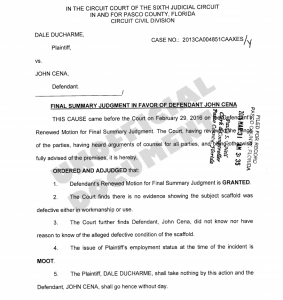
SPOTLIGHTED PODCAST ALERT (YOUR ARTICLE BEGINS A FEW INCHES DOWN)...
If John Cena was extra fired-up to make his WWE return at WrestleMania on April 3, it was because he had just won a legal battle hanging over his head for two-and-a-half years.
On Thursday, March 31, Judge Linda Babb ruled in favor of Cena against contract worker Dale Ducharme, who sued Cena for $15,000 over claimed injuries performing work on Cena’s Florida home. (Pro Wrestling Sheet first reported the news.)
Judge Babb ruled that Ducharme receives nothing and Cena is removed of any legal obligation. The case was closed and the court considers the matter completed.
PWTorch obtained the legal file containing 252 individual events over the past two-and-a-half years in the Circuit Court of Pasco County, Florida:
– The situation dates back to June 2010 when Ducharme was contracted to work on Cena’s 10,000-square-foot home in Land O’ Lakes, Florida. The project was converting the garage into a guesthouse.
Ducharme claimed that he fell from a scaffold, causing bodily injury. He said the scaffold provided to him was “not appropriate for the type of heavy masonry work that was being performed” moving and re-arranging bricks and other heavy objects.
In the civil suit, Ducharme claimed the scaffolding provided for the project was “defective or damaged, either or both of which contributed to the floor of the scaffolding buckling and collapsing.”
Within the suit, Ducharme claimed Cena was negligent in providing an unsafe place to perform the work, an unsafe scaffold, and not equipping other individuals to set up a safe work environment.
Ducharme also claimed numerous bodily injuries, medical and hospital expenses, an inability to work at his previous condition, and aggravation of a previously existing condition.
To capture how long the legal process took, the scaffolding event occurred in June 2010, Ducharme filed suit against Cena in September 2013, and Cena was cleared in March 2016.
Going back to last year, the court record shows that Cena proposed a settlement in March 2015. The file indicating what was proposed has been sealed, though. The legal process continued for another year.
Cena filed another proposal for settlement in February 2016. That document is also sealed. At the same time, Ducharme’s camp filed a 52-page deposition from an expert in the field, William Scharber, attempting to establish Ducharme’s case against Cena. Reading through the lengthy deposition that included sidebars to bike-riding in Florida, it appears the cross-examination of the Scharber ended up casting doubt over the credibility of Ducharme’s claims. One key item was Scharber assessing that Ducharme was about 25 percent to blame for the incident.
Cena then filed a motion on February 24 opposing Ducharme’s motion for a partial summary judgment. Cena also withdrew his proposal for settlement and petitioned the court on February 29 to make a final summary judgment.
 Four weeks later on March 31, Judge Babb granted Cena’s request for final summary judgment and ruled “in favor of defendant John Cena.”
Four weeks later on March 31, Judge Babb granted Cena’s request for final summary judgment and ruled “in favor of defendant John Cena.”
Judge Babb’s reasonings were:
- The Court finds there is no evidence showing the subject scaffold was defective either in workmanship or use.
- The Court further finds John Cena did not know nor have reason to know of the alleged defective condition of the scaffold.
The legal situation was scheduled for trial on two separate occasions in 2014 and 2015, per Ducharme’s initial request in September 2013 for a jury trial.
In September 2014, a jury trial was set for the beginning of 2015. However, the court ordered the case go to mediation. That did not resolve the situation, so in April 2015, a trial was scheduled again for later in the year. However, that was delayed until 2016.
Instead, Cena’s side eventually filed a motion demanding summary judgment. Cena won and was cleared of the $15,000 claim filed by Ducharme with no further legal obligation.




Leave a Reply
You must be logged in to post a comment.